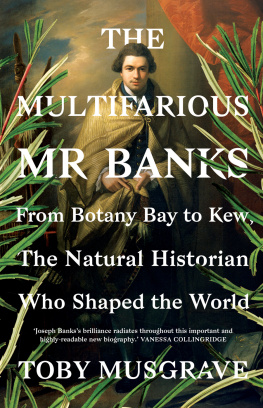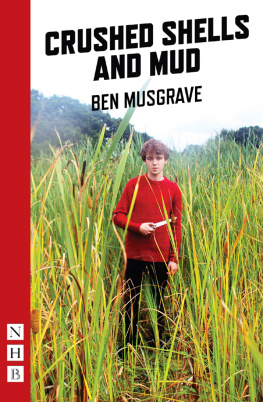Toby Musgrave - The Multifarious Mr. Banks
Here you can read online Toby Musgrave - The Multifarious Mr. Banks full text of the book (entire story) in english for free. Download pdf and epub, get meaning, cover and reviews about this ebook. publisher: Yale University Press, genre: Detective and thriller. Description of the work, (preface) as well as reviews are available. Best literature library LitArk.com created for fans of good reading and offers a wide selection of genres:
Romance novel
Science fiction
Adventure
Detective
Science
History
Home and family
Prose
Art
Politics
Computer
Non-fiction
Religion
Business
Children
Humor
Choose a favorite category and find really read worthwhile books. Enjoy immersion in the world of imagination, feel the emotions of the characters or learn something new for yourself, make an fascinating discovery.
- Book:The Multifarious Mr. Banks
- Author:
- Publisher:Yale University Press
- Genre:
- Rating:3 / 5
- Favourites:Add to favourites
- Your mark:
- 60
- 1
- 2
- 3
- 4
- 5
The Multifarious Mr. Banks: summary, description and annotation
We offer to read an annotation, description, summary or preface (depends on what the author of the book "The Multifarious Mr. Banks" wrote himself). If you haven't found the necessary information about the book — write in the comments, we will try to find it.
The Multifarious Mr. Banks — read online for free the complete book (whole text) full work
Below is the text of the book, divided by pages. System saving the place of the last page read, allows you to conveniently read the book "The Multifarious Mr. Banks" online for free, without having to search again every time where you left off. Put a bookmark, and you can go to the page where you finished reading at any time.
Font size:
Interval:
Bookmark:
THE MULTIFARIOUS MR BANKS
Further praise for The Multifarious Mr Banks:
This well-researched and even-handed biography of Banks confirms his importance as a pioneering scientist, philanthropist and explorer. Graham Seal, author of The Savage Shore
A superbly written biography of the longest sitting president of the Royal Society. Professor H. Walter Lack, Freie Universitt Berlin

Copyright 2020 Toby Musgrave
All rights reserved. This book may not be reproduced in whole or in part, in any form (beyond that copying permitted by Sections 107 and 108 of the U.S. Copyright Law and except by reviewers for the public press) without written permission from the publishers.
For information about this and other Yale University Press publications, please contact:
U.S. Office:
Europe Office:
Set in Adobe Garamond Pro by IDSUK (DataConnection) Ltd
Printed in Great Britain by Gomer Press Ltd, Llandysul, Cerdigion, Wales
Library of Congress Control Number: 2020932737
ISBN 978-0-300-22383-5
A catalogue record for this book is available from the British Library.
10 9 8 7 6 5 4 3 2 1
This book is in memoriam of my brother Will, with whom I first wrote about Banks in 1998 and who died too young on 17 April 2016. You are much missed.
Contents
Illustrations
BETWEEN PP. 110111
BETWEEN PP. 174175
Acknowledgements
My first and biggest thank you must go to my perennially tolerant wife Vibeke for her never-failing good humour, inspired ideas and stoic forbearance you are a pillar of wisdom and support. Tusind tak, min dejlige kone.
It is not possible to write on Banks without a deep debt of gratitude to those who have walked the path before, in particular the Australian scientist Harold B. Carter and the novelist and biographer Patrick OBrian for their revealing biographies. I am also grateful to the editors of Bankss various travel journals, who included so much in the way of insightful notes: Averil M. Lysaght, the New Zealand biologist on the Newfoundland journal; the New Zealand historian and scholar John Beaglehole on the Endeavour journal; and most recently the Icelandic historian Anna Agnarsdttir on the Iceland journal. And thanks go too to those who have researched and published, and who continue to research and publish, on Bankss specific activities, endeavours and spheres of influence, in particular Harold B. Carter once again, and more recently the Australian academic John Gascoigne. Last but by no means least a great debt is owed to Neil Chambers, executive director of the Sir Joseph Banks Archive Project, for his peerless and tireless work organising thematically the Banks correspondence, and for the multiple volumes that have resulted from it. However, in this day and age it cannot but be regretted that the results are available only in print form and not, like the University of Cambridges Darwin Correspondence Project, available online too.
With Bankss surviving correspondence and papers so globally distributed in about fifty institutions, a debt of thanks is owedto staff at the various institutions who have cheerfully, promptly and helpfully responded to my diverse queries. Thanks go in particular to Cecilia Alvik and Alison Kenney at the City of Westminster Archives Centre; to Judith Curthoys at Christ Church; to Jose Guerrero at the Sutro Library; to Kathryn Jones at Lincolnshire Archives; to Sarah Morley and Elsie Edmonds at the State Library of New South Wales; to Dr Martin Nickol, keeper of the Botanic Garden at the University of Kiel; to Dr Jrg Rathjen at the Landesarchiv Schleswig-Holstein; to Philip Temple at the Survey of London; and to the librarians of the Royal Society and the Society of Antiquaries of London.
Last, but by no means least, thank you to Heather McCallum and her team at Yale University Press for their enthusiasm, their preternatural patience during the writing process and for giving me the opportunity to turn a long-held wish into a reality.

Introduction
Sir Joseph Banks was only twenty-five years old when in 1768 he convinced both the prestigious Royal Society and the bureaucratic Admiralty that he should join HMS Endeavour as expedition natural historian. He personally paid a fortune to undertake the three-year voyage led by James Cook, and en route became the first European to make an extensive study of the natural history and anthropology of Tahiti,greatly to the planning of Matthew Flinderss first circumnavigation of Australia, and from London expended much effort securing the long-term viability and success of New South Wales; work for which he earned the sobriquet father of Australia.
Charismatic and engaging, Banks inspired easy friendships that enabled him to develop and work an extensive and influential network. Perennially curious, his gift of finding interests in common with people of all ages and classes made his life one of rich discovery in the widest sense. Self-determined and enterprising, with a keen ability to discern opportunities, he was a consummate organiser who effectively progressed projects from conception to conclusion. He was honourable and deeply patriotic, but he could also be stiffly polite, withering in rebuke, overbearing and unforgiving, and certain contemporaries commented on his social unconformity.
Banks was one of the most prominent and influential men of his age: a leading scientific influence on the English Enlightenment and a pivotal figure in the development and expansion of British domestic and imperial ambitions. Heralded as the most famous man in England when he returned with Cook from his first circumnavigation, he became the centre of a network of more than 600 international correspondents, including the great Linnaeus. Yet in the century following his death, Banks fell into obscurity. In an age of subject specialisation, new generations of scientists excluded him and dismissed his contributions as amateur. He continues to be a curiously neglected figure in his native country, overlooked in part because, unlike his peers Joseph Priestley (the innovative research scientist) and Lord Robert Clive (the military adventurer-coloniser), his interests were almost too broad: although certainly a man with many sides to his character, many accomplishments to his name, he is difficult to classify and label under a single heading: he lacks a single unique accomplishment by which historians might simply categorise him.
A savant, a dedicated improver in the true Enlightenment sense and a strong believer in the Baconian model of scientific discovery, he loomed large over an age when science and Britain were both rapidly advancing and expanding their spheres of influence. It is time we take a new look at this compelling gentleman, who through his multifarious achievements, shaped the world.

And just one editorial note: where Banks is quoted I have not corrected his idiosyncrasies of spelling and grammar; they are part of the character of the man.
ONE

The Banks Family and the Young Joseph
THE BANKS FAMILY
A son was born on 13 February 1743 at 30 Argyll Street in Soho, London to William (171961) and Sarah Banks (17191804), both then aged twenty-four. The announcement of this happy event in that months issue of The Gentlemans Magazine was one of only seven, and the only one in which the mother was not listed as noble, royal or the lady of her husband. That the birth was announced at all, however, was indicative that the fathers status warranted it, but that Sarah was identified only as the wife of a member of Parliament suggests that the editor considered the family as arriviste which indeed it was. At his baptism in the Sir Christopher Wren-designed church of St Jamess Piccadilly, a fortnight later on 9 March, the boy was christened Joseph.
Next pageFont size:
Interval:
Bookmark:
Similar books «The Multifarious Mr. Banks»
Look at similar books to The Multifarious Mr. Banks. We have selected literature similar in name and meaning in the hope of providing readers with more options to find new, interesting, not yet read works.
Discussion, reviews of the book The Multifarious Mr. Banks and just readers' own opinions. Leave your comments, write what you think about the work, its meaning or the main characters. Specify what exactly you liked and what you didn't like, and why you think so.













